Mary Anne Yarde's Blog: The Coffee Pot Book Club , page 87
June 2, 2020
#BookReview — The Cold Hearth (The Atheling Chronicles #3) by Garth Pettersen #HistoricalFiction #AngloSaxon @garpet011

The Cold Hearth(The Atheling Chronicles #3)By Garth Pettersen
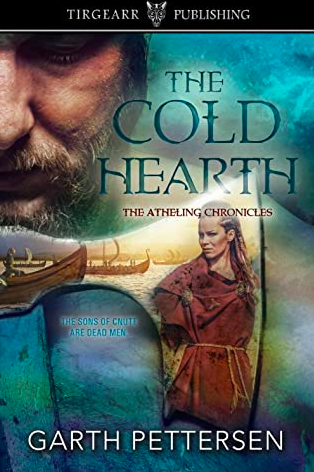
"The sons of Cnute are dead men."
The dying words of his brother's assailant travel across the North Sea to the English Midlands.
Harald, the king's second son, receives the warning while rebuilding a hall where he hopes to farm and lead a peaceful life with Selia, his Frisian wife. But as the hall nears completion, they learn the family who lived there before them all perished in a single night of bloodshed. Could the grounds be cursed?
Now the threat of unknown enemies casts a long shadow. Should they distrust the brooding Saxon neighbor or the two weapon-bearers they hired for protection? Should they suspect either of the two women they have taken on with the other hirelings? Only their Jewish warrior friend, Ravya ben Naaman, seems to be the only one above suspicion.

"How many more would die because of me, because of who I am?"
It was a question with no answer. Harald Harefoot knew that he must always be on his guard. He did not even have the reassurance of his brothers’ sword arm, and loyalties can never be assured when a bag of silver is dangled in front of your face.
But when the dying words of his brother's failed assassin travelled across the North Sea to the English Midlands, Harold knows that it will only be a matter of time before his destiny catches up with him. Until then, Harold must do everything in his power to keep his wife and his people safe.
However, in this complex game of succession and thrones, the real enemy is closer than even Harold could have foreseen…
From a festering wound that threatened to destroy a man’s soul to the desperate fight to stay alive, The Cold Hearth (The Atheling Chronicles #3) by Garth Pettersen is in all ways a Historical Fiction triumph.
With an enthralling sense of time and place, Pettersen has presented his readers with another beguiling novel about a man who history has overlooked. With a lack of sources on Harold, Pettersen has used a healthy dollop of creative licence to pen a story that is a tautly gripping account of not only this period in time, but also this very elusive man. Although history tells us that Harold reigned for only five years and died mysteriously when he was 24, Pettersen has decided to give us an older, wiser, Harold whose actions give the reader a hint at what kind of king he would become. It is always a risk when an author meddles with the known documented history, but in this case, I think the risk was definitely worth it. As with the other books in this series, I adored the depiction of Harold. Harold is a man that commands respect — he is fair-minded, generous, and wise beyond his years. However, he is also in the line of succession which makes him a target not only for those who have malicious intent towards his father’s throne, but also his own brother, who sees Harold as a threat to his rightful inheritance. I thought Harold’s portrayal was absolutely sublime. Pettersen has given his readers a protagonist that one can really get behind and root for.
The comparison between the three sons of Cnute is cleverly portrayed — Sweyn, whose drunken stumbling almost gets him killed, Hartha, whose arrogance seemingly knows no bounds, and Harold, who simply wants what is best for his family and his father’s kingdom. As with many princes of the realm the sons of Cnute, with the exception of Harold, bask in their own importance, while at the same time having one eye on their father’s throne. Although this book follows Harold’s journey and Sweyn and Hartha only grace the pages of this book for but a moment, their presence is still felt. Hartha's ruthlessness and mistrust of his brother probably says more about his character than it does about Harold. Hartha was a character that I found endlessly fascinating. I thought Pettersen’s depiction of Hartha was fabulous, and who would have thought that one of the antagonists in this story would actually make me laugh out loud with his cocky arrogance.
There is a large cast of characters in this book, but their individuality made it very easy to keep track of who was who. There were some characters like Garren who stole my heart, and there were others, such as Twyla, whose actions were unexpected!
There are several antagonists in this story, but there are two in particular who are not only ambitious but talented and intelligent — a deadly combination indeed. While one fights for gold, the other fights for power. I thought that the antagonists were particularly well-drawn and they certainly added a sense of menace to this tale.
Pettersen writes about this period of history with not only an elegant turn of phrase but also with authority. As I have come to expect from this series, the historical setting has been thoroughly researched. Pettersen is one of those talented authors that can make history come alive, and he has also successfully breathed new life into historical characters that have been dead for centuries. Such an achievement is no easy feat, and I commend Pettersen not only for his exceptional skills as a historian but also as an author. Bravo, Mr Pettersen. Bravo, indeed.
With one eye on the history and the other for what makes a thoroughly entertaining read, The Cold Hearth (The Atheling Chronicles #3) is the kind of book that gets readers of quality Historical Fiction very excited. There is a richness to the narrative, a lyrically pleasing note to the prose. There is also a cinematic approach to the writing — I would love to see this series on Netflix. The Cold Hearth is a story that once started is very difficult to turn away from. I lost track of time as Pettersen swept me away to a world that was violent, yet tantalisingly beautiful. This is the kind of novel that will keep a reader up to the wee hours and deservedly so.
The Cold Hearth (The Atheling Chronicles #3) by Garth Pettersen is a wonderful series, and it will especially appeal to those who have enjoyed Bernard Cornwell’s The Last Kingdom and Michael Hirst’s Vikings.
I Highly Recommend.
Review by Mary Anne Yarde.The Coffee Pot Book Club.
Pick up your copy ofThe Cold Hearth(The Atheling Chronicles #3)Amazon UK • Amazon US
Add The Cold Hearth (The Atheling Chronicles #3)to your “to-read” list on

Goodreads
Garth Pettersen

Garth Pettersen is a Canadian writer living in the Fraser Valley near Vancouver, British Columbia, Canada. When he's not writing, he's riding horses and working with young, disabled riders.
Garth's short stories have appeared in a number of anthologies, and in journals such as Blank Spaces, The Spadina Literary Review, and The Opening Line Literary 'Zine. His story River's Rising was awarded an Honourable Mention for the Short Story America 2017 Prize, and his fantasy novella, River Born, was one of two runners-up in the Wundor Editions (UK) Short Fiction Prize. His debut novel, The Swan's Road (Book #1 of the Atheling Chronicles) published by Tirgearr Publishing was released in 2017 and Book #2, The Dane Law, in September of 2018.
Connect with Garth: Website • Goodreads • Twitter.
Have you always wanted to write a Historical Fiction book but don't know where to start? Check out these fabulous Writing and Publishing Tips! #HistoricalFiction #amwriting
Promoting Historical Fiction since 2015
Writing and Publishing Tips

You have always dreamed of becoming an Historical Fiction author. You have a fantastic idea that will make a great story. But… Where do you start?
It can all seem rather daunting, but don't let that put you off. Think of it as an exciting journey of discovery — the beginning of a new and beautiful romance. However, as with life, you will find that what works for one writer may not work for another. What you need to do is find out what works for you.
The links below may help answer some of your questions. Please note, many of these links take you to other blogs and websites.
How to start writing a book
How to hook your reader in chapter 1
How to write believable characters.
How to write memorable characters
How to write a backstory.
How to write dialogue.
Four steps for writing romantic relationships that make sense
How to build a scene
Foreshadowing, what is it?
How (and when) to use documents in historical fiction
How to outline a novel
How to banish writer's block
How to write historical fiction in 10 easy steps
10 essential research tips for historical fiction writers.
50+ top online research resources for historical fiction writers.
5 steps to writing a series
Top writing tips from Andrew Noakes, historical fiction editor.
Storming the convention of Historical Fiction
Historical Writers Forum and advice group
Computer software for authors
Tips on editing
Understanding Copyright: 5 things new authors should know
How to make a living as a writer
6 steps to a Traditional Publishing deal
Frequently asked questions about literary agents
How to publish a book on Amazon
How to publish a book on Barnes and Noble
What is an ISBN and do you need one?
What is legal deposit (UK)?
Get to grips with Social Media: Twitter Tips for Newbies
Checklist for Authors
June 1, 2020
Join me in conversation with Henry, the King's Cavalier #HistoricalFiction #CharacterInterview #EnglishCivilWar @ElizStJohn
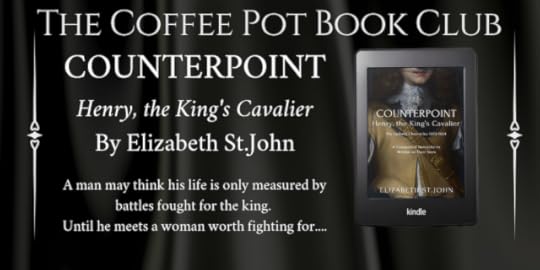
COUNTERPOINT:
Henry, the King's Cavalier
(The Lydiard Chronicles: 1603-1664)
By Elizabeth St.John
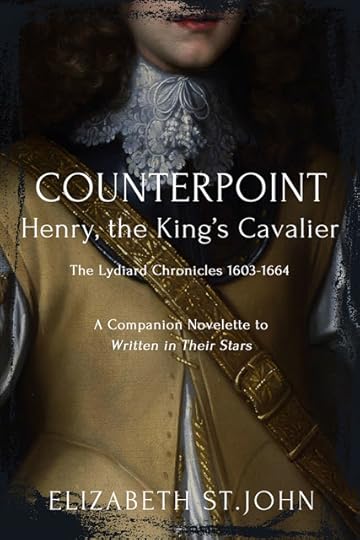
A man may think his life is only measured by battles fought for the king. Until he meets a woman worth fighting for.
Henry Wilmot. Cavalier. Seasoned soldier. Grieving widower. On the eve of battle he is sent by the king to requisition arms. What he did not expect was that the supplies were a gift from a feisty and attractive widow who was hiding her own Royalist beliefs in plain sight. Even more alarming was that his quest took him into the heart of an enemy Parliamentarian household. Will Henry survive the fight of his life? And will Nan remember him if he does?
A counterpoint is a melody played in conjunction with another, or an opposing viewpoint in an argument. Our lives are complex, and each one of us carries within us a counterpoint to another’s story.
A Conversation with Henry, the King's Cavalier
Mary Anne: Good day, my Lord. It is my pleasure to welcome you to The Coffee Pot Book Club. Could you tell us a little about yourself for those who may not know who you were, I mean, are?
Henry Wilmot: My names is Henry Wilmot, Earl of Rochester, at your service. You may know me as the man who saved the life of my noble sovereign, King Charles, smuggling him from the battle of Worcester and hiding him as we fled the Roundheads. Although I will give him his due – the oak tree was his idea. I prefer to be remembered as a soldier, a cavalier, a man who cared as much for the wellbeing of his men as fighting for the cause. And who loved a woman so much I risked life and limb to sneak back to England and visit her in enemy territory while I was exiled in France.
 Boscobel House, home of The Royal Oak.
Boscobel House, home of The Royal Oak.
 The Royal Oak.
The Royal Oak.
Mary Anne: I am sure many of us remember your noble deeds. Tell me if you could live anywhere in the world, where would it be?
Henry Wilmot: Why Merrie England, of course. Yes, I’ve fought in the Lowlands of Germany. The Highlands of Scotland. I’ve begged for money at the Spanish Court — not for myself of course, but for the king. And my worst nightmare was exile at the Louvre Palace in Paris, locked down with a bevy of bored, gossiping courtiers with nothing to do and no means if we did. Absolute hell. I’m as simple man at heart. All I need is a pint of good English ale, served by a loyal landlord in a welcoming English inn. And a steady horse to take me home at the end of the night to my own dear wife in Oxfordshire’s fair country.
Mary Anne: What is your biggest regret?
Henry Wilmot: Leaving the wine cellar at the Louvre without finishing every last bottle.
Mary Anne: Dare I ask, what is your most embarrassing memory?
Henry Wilmot: Well, if you promise not to share, the time I donn’d the guise of a washerwoman to conceal myself on a secret visit to England. It wasn’t wearing a dress that bothered me as much as the pinch on my bottom from the damn’d Roundhead who took a fancy to me. And, it took me a fortnight to grow my moustache back.
Mary Anne: Which do you prefer, fine dining or a picnic?
Henry Wilmot: Ah – you mean a pique-nique? Those Frenchies know how to make a feast from a hunk of bread, a fresh wheel of cheese and a bottle of burgundy. Better than those interminable courses of fandangled, over-seasoned banquets that trap you for hours talking nonsense to a courtier who doesn’t know his head from his elbow. Fresh air and merry company every time for me.
Mary Anne: Thank you so much for taking time out of your busy day.
If you would like to learn more about Henry Wilmot then be sure to pick up your copy of COUNTERPOINT: Henry, the King's Cavalier.
Add COUNTERPOINT: Henry, the King's Cavalier to your ‘to-read’ list on

Catch up with the award-winning
‘The Lydiard Chronicles’
on
Elizabeth St.John

Elizabeth St.John was brought up in England, lives in California, and spends most of her time in the 17th Century. To inspire her writing, she has tracked down family papers and residences from Nottingham Castle, Lydiard Park, and Castle Fonmon to the Tower of London. Although the family sold a few castles and country homes along the way (it's hard to keep a good castle going these days), Elizabeth's family still occupy them - in the form of portraits, memoirs, and gardens that carry their imprint. And the occasional ghost. But that's a different story...
Connect with Elizabeth: Website • Facebook • Twitter • Amazon Author Page.
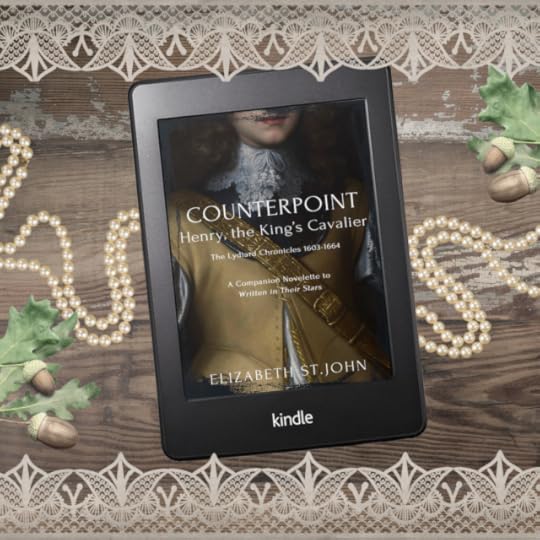
Check out Sharon Bennett Connolly's fabulous new book — Ladies of Magna Carta #History #Medieval #NewRelease @Thehistorybits
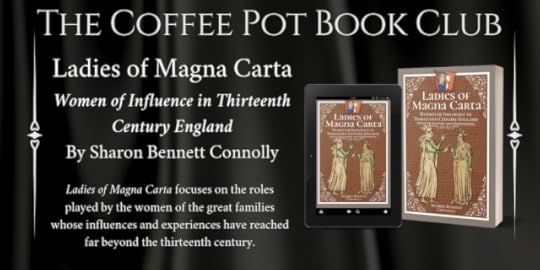
Ladies of Magna Carta
By Sharon Bennett Connolly
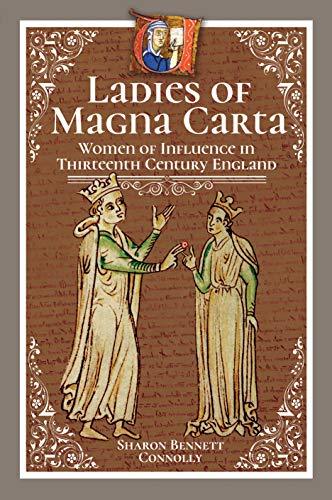
Magna Carta clause 39: No man shall be taken, imprisoned, outlawed, banished or in any way destroyed, nor will we proceed against or prosecute him, except by the lawful judgment of his peers or by the law of the land.
This clause in Magna Carta was in response to the appalling imprisonment and starvation of Matilda de Braose, the wife of one of King John’s barons. Matilda was not the only woman who influenced, or was influenced by, the 1215 Charter of Liberties, now known as Magna Carta. Women from many of the great families of England were affected by the far-reaching legacy of Magna Carta, from their experiences in the civil war and as hostages, to calling on its use to protect their property and rights as widows. Ladies of Magna Carta looks into the relationships – through marriage and blood – of the various noble families and how they were affected by the Barons’ Wars, Magna Carta and its aftermath; the bonds that were formed and those that were broken.
Including the royal families of England and Scotland, the Marshals, the Warennes, the Braoses and more, Ladies of Magna Carta focuses on the roles played by the women of the great families whose influences and experiences have reached far beyond the thirteenth century.
Excerpt
Margaret of Scotland
It took a little longer to resolve the futures of the king’s two sisters who had been held hostage in England since 1209. Margaret, the eldest daughter of William I and Ermengarde de Beaumont, had been born sometime between her parents’ marriage in 1186 and 1195, unfortunately we cannot be more specific. We do know that she was born by 1195, as she was mooted as a possible heir to King William I in the succession crisis of that year, when the king fell gravely ill. Several options were proposed at the time, including marrying young Margaret to Otto of Saxony, nephew of King Richard I. However, it was also proposed that Margaret should not even be considered as heir, that the kingdom should pass to her father’s younger brother, David. In the event, King William recovered and none of the options were pursued, but at least it means that we know Margaret was born before 1195. And when her brother, Alexander, was born in 1198, Margaret’s position as a possible heir was diminished further.
When she was taken as hostage, therefore she may have been as old as 22 or as young as 14. Given the apparent youth of Ermengarde on her wedding day, Margaret’s date of birth is more likely to have been 1190 or later. John’s demand of Margaret and Isabella as hostages, with the sweetener that they would be brides for his own sons, may well have been to prevent Margaret marrying elsewhere. King Philip Augustus had proposed a marriage between himself and Margaret, a union John would be keen to thwart. Thus, John’s control of the marriages of Margaret and Isabella would mean that they could not marry against the king of England’s own interests. It also meant that King William had lost two useful diplomatic bargaining chips; marriage alliances could be used to cement political ones, and these had been passed to John, weakening William’s position on the international stage. According to the chronicler Bower, the agreement specified that Margaret would marry John’s son, Henry, while Isabella would be married to an English nobleman of rank.
While hostages in England, Margaret and Isabella were kept together, and lived comfortably, although John’s promise of arranging marriages for the girls remained unfulfilled. One can imagine the frustration of the Scots, to see their princesses languishing in the custody of the English, however comfortably, with their futures far from decided. There must have been considerable pressure from the Scots for a resolution to the situation, to the extent that the princesses are the only women to be identified in Magna Carta; clause 59 of the charter specifically mentions the king of Scots’ sisters and promises to seek a resolution to their situation. Unfortunately, King John tore up Magna Carta almost before the wax seals had dried, writing to the pope to have the charter declared void, leaving Alexander to join the baronial rebellion.
Pick up your copy of
Ladies of Magna Carta
Sharon Bennett Connolly
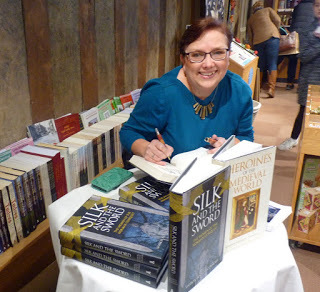
Sharon Bennett Connolly has been fascinated by history her whole life. She has studied history academically and just for fun – and even worked as a tour guide at historical sites. For Christmas 2014, her husband gave her a blog as a gift – www.historytheinterestingbits.com – and Sharon started researching and writing about the stories that have always fascinated, concentrating on medieval women. Her latest book, Ladies of Magna Carta: Women of Influence in Thirteenth Century England, released in May 2020, is her third non-fiction book. She is also the author of Heroines of the Medieval World and Silk and the Sword: The Women of the Norman Conquest. Sharon regularly gives talks on women's history; she is a feature writer for All About History magazine and her TV work includes Australian Television's 'Who Do You Think You Are?'
Connect with Sharon: Blog • Facebook • Twitter • Amazon
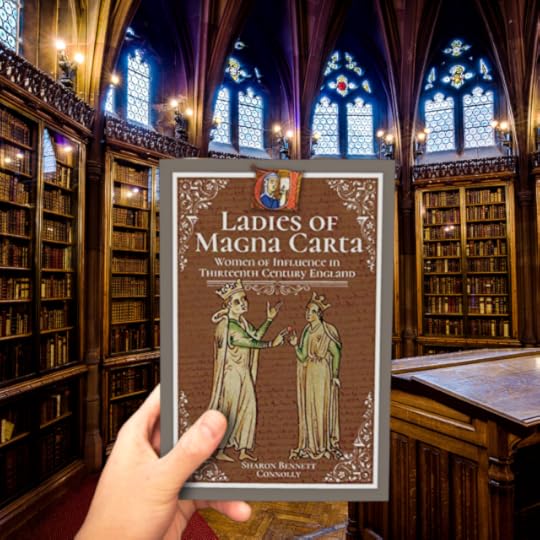
#BookReview — Epiphany - THE GOLDING by Sonya Deanna Terry #HistoricalFantasy #Metaphysical @epiphN_E
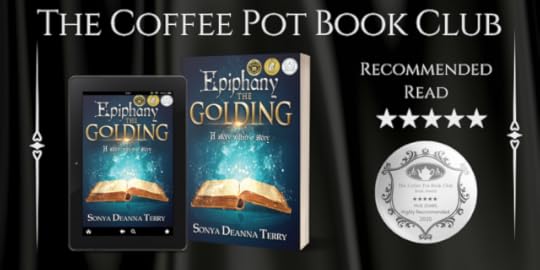
Epiphany - THE GOLDINGBy Sonya Deanna Terry
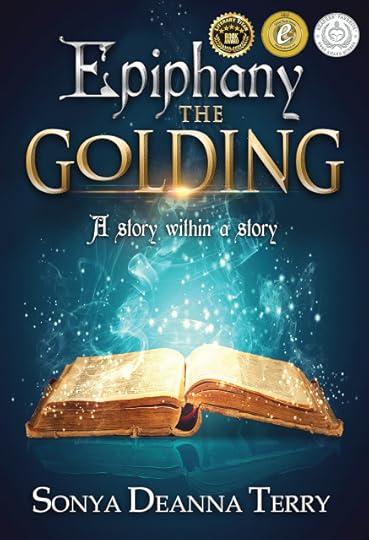
ENGLAND 1767
Edward Lillibridge is writing a farewell letter to his son. The controversial author faces trial for heresy after revealing, in a book, the true beginnings of money.
FAST-FORWARD TO THE MILLENNIUM
…six months before the Global Financial Crisis rocks the economy. Lillibridge's Our True Ancient History, published under the guise of fiction, is out-of print, available only at antiquarian bookshops and largely overlooked.
Until now.
Rosetta Melki, an idealist whose dream of starting a worldwide charity has been all but crushed by her sole-parent struggles, is enchanted by Our True Ancient History. Lillibridge's tale about a gold-obsessed kingdom (and the sprites they enslave: elfin clan dwellers whose currency of choice is kindness) has ignited a memory Rosetta cannot explain.
Rosettta's website surrounding the reading group she's begun with friends has inspired the emergence of other Lillibridge book clubs. Her own Sydney group meets fortnightly at a vintage bungalow, the rental home she secured to escape a gruesome intruder.
In a more affluent part of Sydney, finance executive Matthew Weissler (polished, successful, admired) has been questioning his slave-to-the-dollar existence and his marriage to a tantrum-throwing shopaholic. And now he's questioning his sanity after finding he's been followed by an elf.
Rosetta’s intruder still lurks in the shadows, but who could the stranger be? A prowler from the suburb Rosetta and her teenaged daughter fled...or a traveller from the past, determined to suppress an ancient memory that will change the world forever?

‘Where are you from?’ I asked. ‘How do you know of such…magic?’
Sometimes to understand the beginning, one must first reach the end. But if any semblance of such a thought flittered through Rosetta Melki's mind when she formed her book club, Friday Fortnight, she would never recall. All she knew was that she had become utterly mesmerised by the 17th Century book by Reverend Edward Lillibridge, titled Our True Ancient History. What she had initially thought was a work of fiction started to have a tantalising ring of truth to it. Rosetta had always believed in the spiritual, but this was something new, something tangible. There was something as fresh as there was ancient about this novel, and of course, there was that elusive white rabbit that only she could see.
To the outside world, Matthew Weissler had it all — money, success, a beautiful wife. But Matthew was coming to the shocking realisation that his life had become something close to resembling a facade. Conflicted with emotional turmoil, Matthew must find the courage to listen to his heart and take the road he was destined to travel. Such conflicting emotions would perhaps explain the elf and the eagle that demanded to know if he was planning on wasting the rest of his life.
Izzie, Rosetta’s teenage daughter, may well have had a passing concern for her mother’s sanity, but her attention was on something far more important than her eccentric parent. There was a new boy in her school. Glorion Osterhoudt looked exactly like the boy she had dreamt of when she was a child, but such a thing was just a coincidence, wasn’t it…?
From the dusty pages of an old book to the realisation that the past and the present are on course to collide, Epiphany - THE GOLDING by Sonya Deanna Terry is a work of exceptional scholarship.
To pen a story in which spiritual and contemporary ideas and beliefs collide is challenging in its own right, but add to that two very different timelines is something that only a master bard should attempt. But there is magic in the air, and a master bard, Terry most certainly is.
Not only has Terry penned a book that is so unreservedly bewitching that at times I lost myself so thoroughly that I forgot where I was, but she has also written a book where the realism is tangible. This is a story that if I reached out, I fancied I could touch the softness of the rabbit’s fur, and feel the gentle breeze coming off the ocean. There is a richness to the narrative, a poetic embrace within the prose. This is the kind of book that demands your attention and rightly so, for the tale is extraordinary and yet somehow so comfortingly familiar that the line between reality and fantasy becomes blurred.
Initially, I was concerned about the vast cast of characters whose lives play out between the pages of this remarkable book, but my concern turned out to be without cause, for Terry’s careful depictions made it very simple for me to quickly understand the role each character played in this epic tale of the origins of life. With that in mind, however, I am only going to focus on two of the protagonists.
Matthew Weissler is a man who finds himself at a crossroads. His marriage is on the brink of ending, he is no longer satisfied with his career and yet he fears the unknown. Matthew is a really lovely guy who is trapped in a snare of his own making. His wife abuses him terribly both financially and emotionally and yet, because he wants an easy life, he doesn’t say anything. Likewise, his step-children speak to him appallingly, and he accepts the way they talk to him, which at times really made me cringe. When Matthew finally decides to bring about a change, he does not stop to think about it, he jumps into the deep end and desperately hopes his feet will hit the bottom so he can push his way back up again. Matthew was a character that I enjoyed reading about. There is an energy and a goodness about him that I could not help but admire.
Rosetta Melki is a character who really closed the deal on this book for me. Rosetta is a single-mother whose dreams are being crushed by the reality of her situation. She is always trying to make ends meet, and at times it seems as if the world has conspired against her — no matter what she does, she loses. I adored Rosetta. She is a woman I could relate to. She is spiritual. She is loving. She is someone you most definitely want as a friend. But she is also incredibly insecure and she fears that she will never find a man to love her the way she deserves to be loved. I thought Terry’s portrayal of Rosetta was absolutely sublime.
The antagonist of this tale is not a person but a corrupted species — the first civilisation. The Body Kings are corrupted by this gold-tainted illusion that they have about their own superiority. They expect everyone to bow down to them, whether that be celestial or terrestrial. However, one must remember that not all that glitters is gold. This race sucks the very essence from this wonderfully rich world in which they want to have complete domination over. They are a cruel and heartless species, but then Terry introduces her readers to Princess Eidred. Eidred has many of her people’s tendencies, but she also connects with the natural world around her in a way that others do not, and she becomes as much of a victim as the dragons and the elves and the fairies.
Terry’s careful use of symbolism throughout this story means that she can weave the spiritual world with that of the secular. Rosetta is a very spiritual woman. However, her financial instability and her fear that she is too old to find love anchors her very firmly to the here and now. The appearance of a white rabbit should, therefore, come as no surprise. Nevertheless, as her life begins to spiral out of control, Rosetta seemingly misses the significance of the visions that she is having of this particular rabbit. Instead, she questions her own sanity rather than embracing the rabbit’s invitation to awaken to the metaphysical and to step away from the fear that is holding her back. The rabbit is also a reminder of how far away from nature we have become and how significant a seemingly insignificant sentient being is and always will be. Terry suggests that perhaps we should come away from our gold-skinned ancestors and return balance to our world by no longer looking inwards to our own wants.
Likewise, the Forest of Ivy is an idyllically magnificent and beautiful ancient place — a garden, if not Eden then one very much like it. The sprites are natural gardeners who are at one with the environment that they inhabit.
Along with the garden is woven the story of the origins of man, which I thought was well thought through and incredibly evocative. The use of symbols is subtle, but it is so very effective. Bravo, Ms Terry. Bravo, indeed.
The idea of a first civilisation isn’t a new concept — it is explored in-depth in the Silurian Hypothesis. The Earth, our home, is over 400 million years old, so it is not such a leap of the imagination to envisage that we were not the first species to dominate the planet. Terry’s depiction introduces her readers to a world very similar to Tolkien’s Middle-Earth where the Earth is inhabited by wondrously magical creatures who are at one with nature and who happily coincided with each other until the world became corrupted. I thought Terry’s depiction of the first civilisation was painstakingly realistic and drawn with an artist's brushstroke and a novelist’s eye for detail. It certainly made for a very enthralling story.
If you are looking for a book that will sweep you away to a land of magic and destiny, then Epiphany - THE GOLDING by Sonya Deanna Terry is the novel for you. Told with an impressive sweep and brilliance, this is a book that readers of quality fiction can get very excited about. I cannot wait to get my hands on Book 2 of what promises to be the next great Historical Fantasy series.
I Highly Recommend.
Review by Mary Anne Yarde.The Coffee Pot Book Club.
Pick up your copy ofEpiphany - THE GOLDINGAmazon UK • Amazon US
Sonya Deanna Terry

Australian author Sonya Deanna Terry was motivated to write her award-winning Epiphany trilogy because of a passion for history, mystery, romance and magic.
Connect with Sonya: Website • Twitter • Goodreads.
Have you heard? MJ Porter’s fabulous book — The Last Warrior England: The First Viking Age (The Ninth Century Book 2) is now available on #NetGalley #HistoricalFiction #Vikings @coloursofunison @LPOBryan
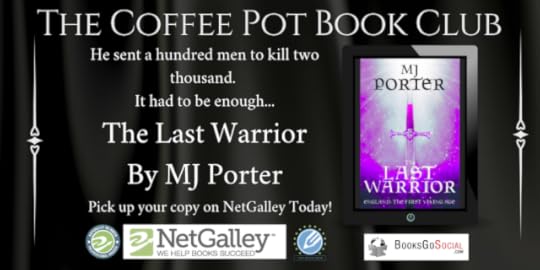
Have you heard…?
MJ Porter’s fabulous book is available on NetGalley for your reading pleasure.
The Last Warrior
England: The First Viking Age
(The Ninth Century Book 2)
By MJ Porter
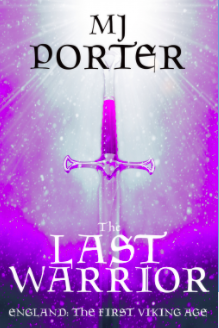
He sent a hundred men to kill two thousand. It had to be enough.
Mercia lies broken but not beaten, her alliance with Wessex in tatters.
Coelwulf, a fierce and bloody warrior, fears no man, especially not the Raiders claiming Mercia as their own.
Coelwulf must travel away from the heart of Mercia, hunting down the Raiders and what he discovers will determine the fate of Mercia, as well as his own.
To request a copy of
The Last Warrior
Click
How It Works (in their own words…)NetGalley connects publishers and authors to an enthusiastic community of early influencers who will help their book succeed: librarians and booksellers who order and recommend books to their patrons, media professionals who interview authors, reviewers and bloggers who write about books online and leave reviews on retail sites, and more. Publishers and authors list their titles on NetGalley for members to request, read, and review, and members gain free access to a vast catalog of digital review copies.
NETGALLEY FOR MEMBERS
NetGalley is a service to help readers of influence discover and recommend new books to their audiences. If you are a reviewer, blogger, librarian, bookseller, educator, journalist or other member of the media, you can use NetGalley for free to request, read, and recommend books before they are published.Your reviews and feedback are essential to publishers and other readers!
Become a NetGalley member today! NetGalley
NetGalley for Authors
Are you an author? Would you like to see your book on NetGalley. The Coffee Pot Book Club offers affordable NetGalley promotion. Click HERE to find out more.
May 31, 2020
#BookReview — Arthur Rex Brittonum (A Light in the Dark Ages) by Tim Walker #Arthurian #HistoricalFiction @timwalker1666

Arthur Rex Brittonum
(A Light in the Dark Ages)By Tim Walker

From the decay of post-Roman Britain, Arthur seeks to unite a troubled land
Arthur Rex Brittonum (‘King of the Britons’) is an action-packed telling of the King Arthur story rooted in historical accounts that predate the familiar Camelot legend.Britain in the early sixth century has reverted to tribal lands, where chiefs settle old scores with neighbours whilst eyeing with trepidation the invaders who menace the shore in search of plunder and settlement.Arthur, only son of the late King Uther, has been crowned King of the Britons by the northern chiefs and must now persuade their counterparts in the south and west to embrace him. Will his bid to lead their combined army against the Saxon threat succeed? He arrives in Powys buoyed by popular acclaim at home, a king, husband and father - but can he sustain his efforts in unfamiliar territory? It is a treacherous and winding road that ultimately leads him to a winner-takes-all clash at the citadel of Mount Badon.Tim Walker’s Arthur Rex Brittonum picks up the thread from the earlier life of Arthur in 2019’s Arthur Dux Bellorum, but it can be read as a standalone novel.

"There is mischief about in our land, now Mordred has returned..."
Arthur had always been a warrior king. He had defeated Mordred once. He would do so again.
But Arthur was no longer the warrior of his youth, and Mordred now had experience on his side. The war, when it came, would change the course of history forever and it would make a legend from a king...
From the desperate battle at Mount Badon to the harrowing final confrontation at Camlann, Arthur Rex Brittonum (A Light in the Dark Ages) by Tim Walker is the enthralling story of the latter half of King Arthur's reign.
With an engrossing sense of time and place, Walker has presented his readers with a novel that is as rich in historical detail as it is in story. It is the tale of one man as he struggles to unite his country and hold onto his crown.
I adore anything Arthurian, so I was eagerly awaiting the next instalment of Walker's A Light in the Dark Ages series. I am pleased to report that the wait was most definitely worth it. This book was simply brilliant!
The origins of a historical King Arthur is, at times, as mythical as the man himself. The sources from this period are incredibly biased depending on whose point of view the source is from. Walker combines both the best and the worst aspects of the Arthurian story from Nennius' Historia Brittonum and Gildas' On the Ruin and Conquest of Britain, and he has penned a novel that is as beguiling as it is entertaining. Like Arthur and Mordred, Nennius and Gildas came from opposing sides — one adored Arthur, the other, it is thought, despised him so much he excluded him from his book! I thought Walker's approach worked well, and it helped to give this book a very balanced view and reminds the reader that not everybody liked this man who was destined to become a romanticised legend.
With one eye on the somewhat subjective secondary sources and another on what makes a book pleasurable, Walker has presented his readers with a plausible Arthur — a very human Arthur, who stumbles, falls, makes mistakes, and has moments of unbearable guilt. Arthur is forever questioning himself, wanting reassurance. The righteous and confident leader who led his men to victory at Mount Badon is replaced with one who is plagued with crippling doubt. I thought Walker's portrayal of Arthur was very authentic in the telling, and he was a character that I relished reading about.
Despite Arthur's importance to this novel, it is the secondary characters that control the narrative, especially in the second half of this novel. Merlyn's sorcery, Guinevere's seduction, and Morgana's plotting make for an action-packed story of strained loyalties and political intrigue. I thought Morgana's depiction was brilliant. Morgana's ambition and her resolve to never give up makes her a formidable opponent. Likewise, Merlyn controls Arthur through carefully thought out games of manipulation — no wonder everyone fears his influence. Of all the characters in this story, it is Merlyn who I think is the most dangerous and the fact that Arthur is so blinkered to this man's faults made this tale all the more appealing.
This novel is split into two parts. In the first part, Walker gives us an Arthur who is passionate about his cause, who is determined to be victorious. In the second part of this book, his enthusiasm seems to waver, and Arthur's rule becomes rather lacklustre. He becomes an uninspiring figurehead which, for a king who had promised much, was a bitter disappointment for his subjects. His enthusiasm for the throne and the dream of a peaceful, united nation is replaced with the seemingly unquenchable passion for the flesh. Love makes fools of us all, it seems, and it certainly makes a fool of Arthur in this story.
Walker has depicted a nation at war, not only with the Saxon invaders but with itself. War is seemingly inevitable, and it is one of the major themes in this novel. Walker is an author who excels in creating believable battle scenes. Walker does not shy away from the bloodshed and the carnage, but what I found incredibly fascinating were the characters themselves as they fought a war where the losers died, and the survivors were either victorious or were fated to spend the rest of their lives as slaves. There is also a delicate balance between brutal violence and knightly chivalry in this book. The kings and knights that Walker introduces us to, are fighting for their kingdoms and for themselves, but there are also those who are unwilling to commit to a side but would rather wait and see which way the wind blows! I thought this political uncertainly was a wonderful insight into the complicated allegiances of the Early Medieval Period.
Arthur Rex Brittonum (A Light in the Dark Ages) by Tim Walker is a novel that I really enjoyed. It will undoubtedly appeal to those who love everything Arthurian, but I also think fans of very battle heavy historical fiction would enjoy it as well.
I Highly Recommend.
Review by Mary Anne Yarde.The Coffee Pot Book Club.
Pick up your copy ofArthur Rex BrittonumAmazon UK • Amazon US
Tim Walker

Tim Walker is an independent author living near Windsor in the UK. He grew up in Liverpool where he began his working life as a trainee reporter on a local newspaper. He then studied for and attained a degree in Communication studies and moved to London where he worked in the newspaper publishing industry for ten years before relocating to Zambia where, following a period of voluntary work with VSO, he set up his own marketing and publishing business.
His creative writing journey began in earnest in 2013, as a therapeutic activity whilst undergoing and recovering from cancer treatment. He began writing an historical fiction series, A Light in the Dark Ages, in 2014, following a visit to the near-by site of a former Roman town. The aim of the series is to connect the end of Roman Britain to elements of the Arthurian legend, presenting an imagined history of Britain in the fifth and early sixth centuries.
His new book, published in June 2020, is Arthur, Rex Brittonum, a re-imagining of the story of King Arthur (book five in the series). It follows on from 2019’s Arthur Dux Bellorum, the story of young Arthur (book four in the series), that received recognition from two sources in 2019 - One Stop Fiction Book of the Month in April, and an honourable mention in the Coffee Pot Book Club Book of the Year (Historical Fiction) Awards. The series starts with Abandoned (second edition, 2018); followed by Ambrosius: Last of the Romans (2017); and book three, Uther's Destiny (2018). Series book covers are designed by Canadian graphic artist, Cathy Walker. Tim is self-published under his brand name, timwalkerwrites.
Tim has also written two books of short stories, Thames Valley Tales (2015), and Postcards from London (2017); a dystopian thriller, Devil Gate Dawn (2016); Perverse (verse and short fiction, 2020); and two children's books, co-authored with his daughter, Cathy - The Adventures of Charly Holmes (2017) and Charly & The Superheroes (2018) with a third in the pipeline – Charly in Space.
Connect with Tim: Website • Facebook • Twitter • Amazon Author Page.
Join Historical Fiction author, Samantha Wilcoxson, as she takes a look at Life in the time of the Radium Girls #History @carpe_librum
Life in the Times of the Radium Girls
By Samantha Wilcoxson

June 1, 2020 - Luminous Blog Tour
My latest novel, Luminous, takes an intimate look at the life of one of the young women who have become known as Radium Girls. This was a time of great change in the United States and the larger world due to World War I, which was followed by a time of economic boom and devastating crash. In the midst of this, young women discovered opportunities to join the workforce like never before. With men at war, and many sadly not returning, women began to find their place in the world beyond the realm of homemaking.
Some of the jobs that women were able to obtain were those one might expect as seamstresses, laundresses, and in domestic service. Others were new positions in war industries or jobs that had been left open by men. Those were the ones that were seen as exciting new opportunities. Women could work in munitions factories, learn how to perform mechanical work, and paint with an innovative new material that made things glow in the dark.
Catherine Donohue was one of the young women who counted herself blessed to find employment at Radium Dial in Ottawa, Illinois. In the Radium Dial studio, women used radium infused material to paint watch and instrument dials. This enabled soldiers to read information in the dark, and the industry continued after the war as glow-in-the-dark watches became fashionable. Dial painter positions were in high demand due to the good pay and perceived sophistication of working in a studio as opposed to a factory.
 Radium Dial.
Radium Dial.
In the years following World War I, these women enjoyed increased independence and economic comfort. Prohibition also increased women’s freedom in a way. While bars and pubs had formerly been the domain of men, secretive speakeasies became the illicit gathering spots for men and women, having just the opposite effect that the promoters of Prohibition had intended. During this time, women also gained the right to vote and have their voices heard in the public forum. It was an era of fast paced change even before the stock market crash of 1929 and the Great Depression that followed.
The economic downturn of the 1930’s reversed some of women’s gains. With jobs scarce, men felt that they deserved those that were available, and many women of the time agreed with them. Women increased activities at home that could help save money, such as gardening and taking in sewing or laundry. Women working with radium were secure in their employment, but they started experiencing even more disturbing problems.
At Radium Dial in Ottawa and other companies using radium, workers began to experience a myriad of serious health problems. Catherine Donohue first developed a limp that she dismissed as arthritis, though she was in her twenties. Girls began to die of symptoms that were blamed on diphtheria, tuberculosis, sepsis, and even syphilis. It took years for people to realize, and even longer to admit, that the fatal health problems were caused by radium poisoning.

The women suffering from radium poisoning had a fierce battle to fight before their employers were held responsible for the way they had been exposed to dangerous material. Companies continued to exploit the workers long after they knew what radium could do to a person’s health. Catherine Donohue was one of the women who took her case to court as many times as necessary to gain a victory for those who were dehumanized for the sake of company profit.
In Luminous, I have explored Catherine’s life, her work, and her legal and medical battle as she suffered radium poisoning in the 1920’s and 1930’s. I hope that it is a glimpse into the era that is both informative and emotive. Catherine Donohue’s experience left an impact that affects working men and women to this day.
Luminous: The Story of a Radium Girl
By Samantha Wilcoxson
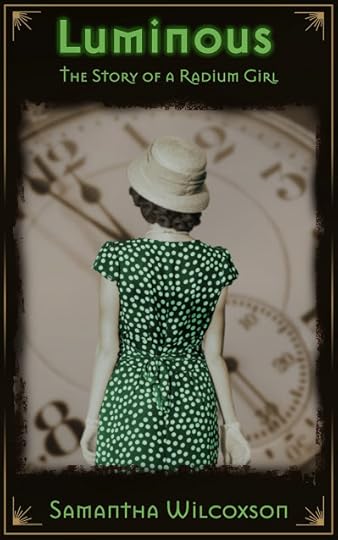
Catherine Donohue's life was set on an unexpected course when she accepted a job at Radium Dial. The pay was great, and her co-workers became her best friends. But a secret was lurking in the greenish-grey paint that magically made things glow in the dark. When Catherine and her friends started becoming sick, this shy Catholic girl stood up to the might of the radium industry, the legal and medical communities, and townspeople who told her to be quiet. Would she be too late?
Catherine's quest for social justice in the era between World Wars is emotive and inspiring.
Pick up your copy of
Luminous: The Story of a Radium Girl
Samantha Wilcoxson
 Samantha Wilcoxson
Samantha Wilcoxson Samantha Wilcoxson is a history enthusiast and avid traveler. Her published works include the Plantagenet Embers series with novels and novellas that explore the Wars of the Roses and early Tudor era. Luminous is her first foray into 20th century American history, but she suspects that it will not be her last. Samantha enjoys exploring the personal side of historic events and creating emotive, inspiring stories.
Connect with Samantha: Facebook • Twitter • Instagram • Goodreads.
May 27, 2020
Join author, Phil Lowe, as he talks about the inspiration behind his fabulous book — The Total Joy of Travelling on Public Transport #Humour #Transport @EM_Theatre
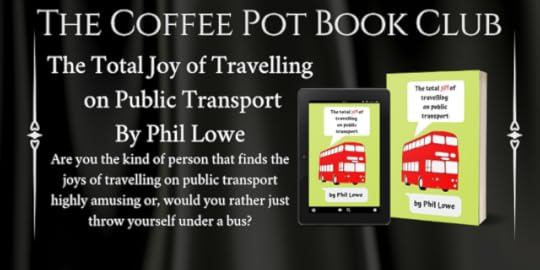
An Author’s Inspiration
By Phil Lowe
They do say that writers should write about what they know. For many years I travelled, on a daily basis, back and forth, hither and thither, on local public transport observing all aspects of human life unfolding, with its vivid dramas and silly humours. Inspiration, mainly comical, for The Total Joy of Travelling On Public Transport came dancing or silly walking toward me on most of my commutes and very often, did a nifty side step in-between. Eight years later and a lifetime's worth of commuting, a strong book idea started to form in my head and eventually in print.
The writing process went from rough notes scribbled on notepads and supermarket paper bags and integrated mini Dictaphone recordings to create fully explored stories. These inspirations often took a surreal turn in the finished tale. Creatively, I also found myself inspired to write in quite some detail about inanimate objects. For example, I explored the contents of an Argos catalogue and The Lady magazine, both found objects left on a vacated bus or tram seat. Conjecture about their history and connection with certain ages and types of people gave me opportunities as a writer of humour to be inventive – turning fact into fiction for fun.
Of course there are always plenty of annoying or odd 'characters' that use public transport that, creatively investigated, give rise to good story-telling. The vital key for me was to use their personalities but, in no way, exploit them by being racist or sexist. I find there is enough humour to mine in the day-after-day transactions of conversation and commuter frustrations to tell plenty of fascinating tales. Imagination is a great tool in bringing people to life on the page. In the book there are over a hundred such examples plus sprinklings of overheard comments.
The Total Joy of Travelling On Public Transport is mostly centred on Nottinghamshire with its terrific tram and bus systems. However to enjoy the stories one doesn't need to come from, or know Nottingham and its people. The tales are universal and in the book, I even discover what Londoners think of bus and tube travel and relay what it felt like, pour moi, travelling on a Bordeaux tram system finding myself with an extremely desperate need to visit a toilet! Write about what you know indeed!
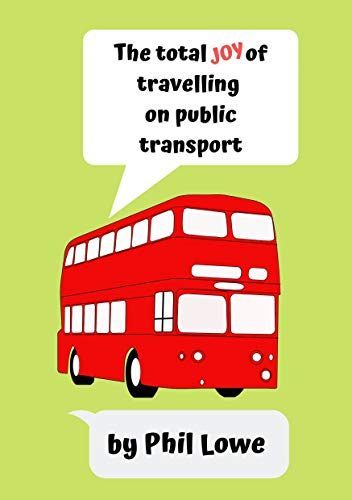
So, as the book blurb says:
'Ah, the total joy of travelling on public transport. Do you love travelling with the delightfully varied public and their dubious electronic gadgets and often odious habits? Do you mind when the person behind you has a full blown argument on their mobile phone with the speaker positioned at extra loud, just so you are sure to get both argumentative sides of the mutual yelling? Is it OK for someone to apply their nail polish on a hot bus, thereby nearly choking the other passengers to death with the toxic fumes? Would special mobile confessionals built into modes of public transport ease the congestion of verbal diarrhoea from total strangers? Do you balk at getting up close and personal with the great unwashed? Are you the kind of person that finds the joys of travelling on public transport highly amusing or, would you rather just throw yourself under a bus?
Grab your copy of
The Total Joy of Travelling on Public Transport
Many thousands of people in Great Britain travel to work and back on public transport. We commuters use the buses, trains and trams, on average, around five days of the week. We endure the pleasure of other passengers talking loudly on their mobiles. Season after season, we delight in strangers coughing their germ clustered spittle all over us, almost to the point where we wonder if it is actually raining inside the vehicle. Some other passengers sit crunching sweets like a starving deaf horse and some salivate wildly as they delve into endless bags of stinky squid and blue cheese flavoured crisps. And, quite often – well, let’s just say it - it gets much worse! I know. I have been there. I mislaid the tee shirt and bought an annual travel pass.'
Phil Lowe

Connect with Phil: Website • Twitter.

Computer Software Programs for authors #amwriting #amediting #writingcommunity
Computer Software Programs for authors
In this competitive market, your manuscript has to shine, regardless of how you hope to publish it. An agent isn't going to look twice at a manuscript full of school-boy errors, and if you are thinking about self-publishing, then your book needs to be at least as good as those produced by the big publishing houses. A Copy Editor (Line Editor) is a must, but there is also a great deal of software out there that states it can help you with the writing process, but also with the editing as well — a bold claim indeed.

So today, I thought we would look at some of the software that is out there for purchase. Please feel free to write in the comment below if you have had success with the software I am going to show you today.
*Please note. I do not endorse any of the companies or software below. The blurb under the logos are the companies own words, not mine!*

Scrivener is a powerful content-generation tool for writers that allows you to concentrate on composing and structuring long and difficult documents. While it gives you complete control of the formatting, its focus is on helping you get to the end of that awkward first draft.
http://www.literatureandlatte.com/scrivener.php

Our software helps turn your good writing into great writing.Improve readability and eliminate errors.
https://prowritingaid.com/

Grammarly makes sure everything you type is easy to read, effective, and mistake-free.
www.grammarly.com

Communicate quickly and accurately with Ginger Page's one stop writing shop – writing tools that help you express yourself better.
http://www.gingersoftware.com/

Meet your new critique partner.
The fresh set of eyes your manuscript needs.Instant, unbiased feedback without the hassleSave time and take control of the editing process.Polish your manuscript and write better fiction.
https://www.autocrit.com/

Expresso is a little tool to edit texts and improve your writing style. It will teach you to express yourself through writing more efficiently and help make your texts more readable, precise, and engaging.
http://www.expresso-app.org/

Scribophile is a respectful online writing workshop and writer’s community. Writers of all skill levels join to improve each other’s work with thoughtful critiques and by sharing their writing experience.
http://www.scribophile.com/

StyleWriter will make you a better writer – we guarantee it. A bold claim we know, but that’s what our users tell us. Thousands of people download StyleWriter every month and use it to edit advertising copy, business reports, contracts, manuals, newsletters or web pages. Even professional journalists and novelists use the program to polish their writing style.
http://www.editorsoftware.com/StyleWriter.html

If you're working on contracts, proposals, reports, technical documents, articles and books, PerfectIt saves time on copy-editing, so that authors can pay more attention to what matters most: the words and their meaning.
http://www.intelligentediting.com/

Hemingway makes your writing bold and clear. It's like a spellchecker, but for style. It makes sure that your readers will focus on your message, not your pose.
http://www.hemingwayapp.com/
So there we have it. A list of software that claims they can help you with your writing and editing. Which software, if any, do you use? Let me know below in the comments!
The Coffee Pot Book Club
...more
- Mary Anne Yarde's profile
- 159 followers



